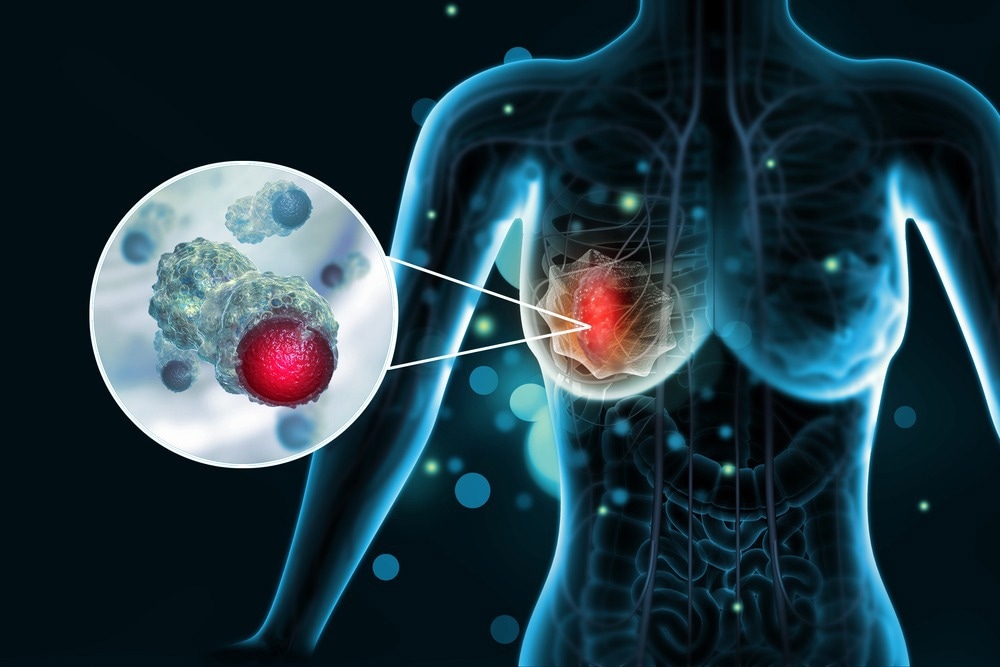What hormone receptors are involved in HDBC?
Why is it important to know breast cancer hormone status?
The prognosis of HDBC
Early detection
Age and hormone status
Recent research into HDBC
Conclusion
References
Further reading
Hormone-dependent breast cancer (HDBC), also known as hormone receptor-positive breast cancer, is a type of breast cancer driven by hormones such as estrogen and progesterone. It is estimated that 70-80% of breast cancers are HDBC, making it the most common type of breast cancer.

Image Credit: crystal light/Shutterstock.com
Understanding the nature of HDBC is vital to further developing effective therapeutic and preventative strategies. Recent decades have seen breast cancer survival rates continuously improve. With better prevention and treatment, we can hope for these rates to improve further.
What hormone receptors are involved in HDBC?
Hormones can promote the growth of breast cancer cells. Hormone receptors are proteins on the cell surface or within cells that attach to hormones circulating in the blood. Normal breast cells have receptors that attach to the hormones estrogen and progesterone. Breast cancer cells can have these too.
ER-positive breast cancers have estrogen receptors and are known as ER-positive (ER+) cancers. Breast cancers with progesterone receptors are called PR-positive (PR+) cancers. Breast cancer that has both types of receptors is simply known as hormone-receptive positive (hormone-positive or HR+) breast cancer, although this can also be used as a term for any type of HR+ breast cancer (ER+ and PR+). If the cancer does not have any type of receptor, it is known as hormone receptor negative (hormone-negative or HR-).
Why is it important to know breast cancer hormone status?
Doctors will take a biopsy of breast cancer cells to determine if it is hormone dependent, and if so, what type (e.g., ER+, PR+, or both). This diagnosis is used to guide treatment plans. Hormone-dependent breast cancer is treated with hormone therapy, which aims to block the effects of estrogen and/or progesterone on the cancer cells. Hormone therapy can be given before surgery to shrink the tumor (neoadjuvant therapy) or after surgery to prevent recurrence (adjuvant therapy).
There are several types of hormone therapy, including selective estrogen receptor modulators (SERMs), aromatase inhibitors (AIs), and gonadotropin-releasing hormone agonists (GnRH agonists). The choice of therapy depends on the type and stage of cancer and the patient's overall health. Treatment plans may include the use of chemotherapy, radiation, and surgery
The prognosis of HDBC
The prognosis of hormone-dependent breast cancer depends on various factors, including the cancer stage, the tumor size, the presence of any secondary tumors, and the patient's overall health.
Fortunately, advances in medicine have led to earlier diagnoses and better treatments, resulting in improved prognoses for most patients diagnosed with HR-positive breast cancer.
In general, HR+ breast cancers have a favorable prognosis in comparison to HR- breast cancers. Recent studies have shown that the 5-year survival rate for ER+ breast cancer is 10% better than for ER- breast cancer.
Early detection
Early detection of breast cancer, not just HDBC, is important because it increases the chances of successful treatment and survival. When breast cancer is detected early, it is usually localized and, therefore, is generally easier to treat. Women who have regular mammograms and perform self-exams have a better chance of detecting breast cancer before it has spread.

Image Credit: Guschenkova/Shutterstock.com
Early detection can also mean that less invasive treatments are required, often resulting in fewer side effects and a better quality of life for the patient. Early detection, therefore, is crucial to increase the chances of successful treatment and prevent complications.
Age and hormone status
Studies have shown that younger women are more likely to have hormone receptor-negative breast cancer than older women. A study published in 2022 in the journal Cureus found a statistically significant association between age and ER expression and between age and PR expression.
Recent research into HDBC
Immunotherapy is a cancer treatment that uses the body's immune system to attack cancer cells. However, most currently available immunotherapies, such as immune checkpoint inhibitors, have shown limited effectiveness against hormone receptor-positive breast cancers. Fortunately, several clinical trials are underway to test the efficacy of immunotherapy in hormone-positive breast cancer.
Precision medicine involves tailoring treatment to a patient's individual characteristics, such as their genetic makeup, tumor characteristics, and metabolic profile. New genomic tests, such as MammaPrint, can help identify patients who may benefit from chemotherapy and others who respond better to endocrine therapy alone.
Conclusion
Overall, understanding hormone-dependent breast cancer is crucial for effective treatment and prevention. Women need to get regular mammograms and report any concerns to a healthcare professional. With early detection and proper management, it is possible to manage HDBC. Over the decades, mortality rates associated with this type of cancer have fallen, with women more likely to survive today than 50 years ago.
References
- Bae, S.Y. et al. (2015) 'Poor prognosis of single hormone receptor- positive breast cancer: Similar outcome as triple-negative breast cancer', BMC Cancer, 15(1). doi:10.1186/s12885-015-1121-4.
- Breast Cancer Hormone Receptor Status [online]. American Cancer Society. Available at: https://www.cancer.org/cancer/types/breast-cancer/understanding-a-breast-cancer-diagnosis/breast-cancer-hormone-receptor-status.html (Accessed May 2023)
- Dubsky, P. et al. (2021) 'A clinical validation study of Mammaprint in hormone receptor-positive breast cancer from the Austrian Breast and Colorectal Cancer Study Group 8 (ABCSG-8) Biomarker cohort', ESMO Open, 6(1), p. 100006. doi:10.1016/j.esmoop.2020.100006.
- Hormone Therapy for Breast Cancer [online]. National Cancer Institute. Available at: https://www.cancer.gov/types/breast/breast-hormone-therapy-fact-sheet (Accessed May 2023)
- Khunger, N. and Mehrotra, K. (2019)' menopausal acne – challenges and solutions', International Journal of Women's Health, Volume 11, pp. 555–567. doi:10.2147/ijwh.s174292.
- Research table: Estrogen receptor status and overall survival [online]. Susan G Komen. Available at: https://www.komen.org/breast-cancer/facts-statistics/research-studies/topics/estrogen-receptor-status-and-overall-survival/#:~:text=People%20with%20ER%2Dpositive%20early,ER%2Dnegative%20early%20breast%20cancer. (Accessed May 2023)
- Shah, A. et al. (2022) 'Correlation between age and hormone receptor status in women with breast cancer', Cureus[Preprint]. doi:10.7759/cureus.21652.
Last Updated: Jun 5, 2023